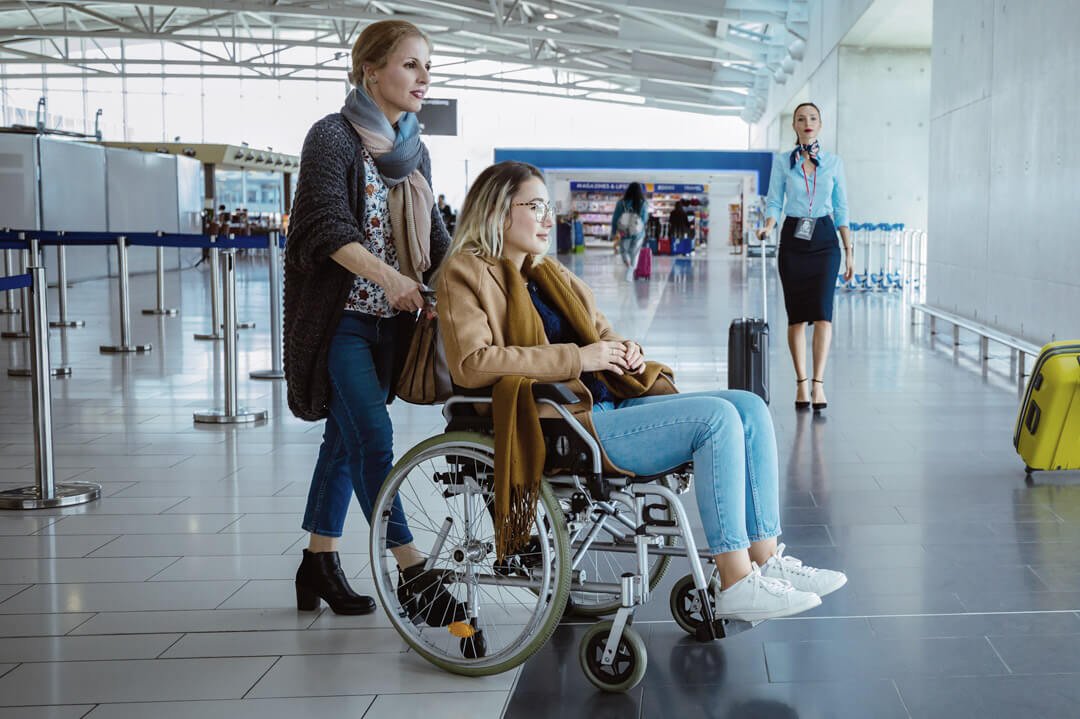Reading Time: 3 minutes
Table of contents
When a stroke occurs, parts of the brain are no longer supplied with enough blood. In the worst cases, this can irreversibly damage the affected brain regions. Therefore, a stroke requires a rapid response, even on holiday. Call the emergency services immediately and seek medical treatment. But even following emergency treatment, the correct ongoing care and treatment for a stroke is crucial to prevent any subsequent damage, or at least minimize it.
Is it okay to fly after a stroke? Important things to know
- It is not uncommon to be recommended not to fly just after a stroke
- Stroke patients have to wait for at least two weeks before flying after a stroke
- Stroke patients are at an increased risk of Deep Vein Thrombosis when flying
- Air ambulances are better equipped for stroke patients to fly since they have a medical team and medical equipment on board

What are the warning signs of a stroke?
Every case of a stroke must be taken extremely seriously. The symptoms can vary greatly from person to person. However, the following symptoms are frequently observed:
- Paralysis on one side of the body or weakness in the arms and legs
- Difficulty speaking
- Dizziness
- Numbness on one side of the body
- Visual disturbances
- Trouble understanding other people
- Problems with balance and coordination
- Loss of consciousness
- Strong headache
If you notice any of these symptoms, call an ambulance immediately, even abroad. Always keep the emergency number ready so you can react quickly. The diagnosis can be made in the hospital abroad so primary medical care can be given. But in order to avoid subsequent damage and to enable optimal rehabilitation, a swift medical repatriation to for e.g. a UK or US specialist clinic is highly recommended.
Is it okay to fly after a stroke?
Generally, you cannot fly for at least two weeks after a stroke. This is because the stroke after-effects and other symptoms are more intense and dangerous a couple of weeks following the stroke and patients should be kept under medical supervision in case new symptoms arise.
After a two-week period, patients should reassess their health, while keeping in mind the impact that the stroke will have on them while flying. It is mandatory to consult their doctor before flying after a stroke to ensure that they are fit to fly.
Dangers of flying after a stroke
It is dangerous to fly after a stroke because of the low oxygen level in the plane cabin which can considerably exacerbate your breathing problems if you have had any after the stroke. Moreover, stroke patients are at an increased risk of Deep Vein Thrombosis (DVT).
DVT is a blood clot that forms in your legs. It can be extremely dangerous since the blood clot can break off and travel to the patient’s lungs or brain.
Additionally, there is no medical equipment or medical team on board a commercial flight to supervise or treat the stroke patient in case of an emergency.
A stroke abroad: medical repatriation
The quality of medical care in many foreign hospitals does not meet UK standards. But especially when a patient has had a stroke, it is important that rehabilitation begins as quickly as possible in order to minimize any subsequent damage. The sooner the patient regains speech and movement skills through therapy, the better the chances of a more or less normal life after a stroke. But how can rapid repatriation after a stroke be organized from abroad if independent travel home is no longer possible?

Medical repatriation by rescue helicopter after a stroke
A tourist was traveling by car from Bordeaux to Barcelona and suffered a stroke shortly after crossing the Spanish border. He was first taken by ambulance to a Spanish hospital and received emergency treatment there. However, the doctors who treated him advised further treatment in a French specialist clinic. Since independent travel back to France was no longer possible, the son of the patient commissioned us to carry out the medical repatriation of his father. We immediately arranged for an ambulance helicopter to fly the patient from Spain to France. There, he was able to have an operation on the very same day, so that fortunately no permanent damage was suffered.
Medical repatriation by ambulance jet after a stroke
In another case, a tourist suffered a stroke in Morocco. He was taken to a hospital where he was given emergency treatment and medical care for a few days. The doctors advised, however, that his treatment should be followed by rehabilitation in a hospital, in order to minimize any subsequent damage. We contacted the attending doctors and organised a rapid medical repatriation in an ambulance jet within a single day. The experienced medical personnel and modern equipment on board meant it would have been possible to intervene at any time if an emergency had occurred.
Going on holiday after a stroke
Anyone who has already suffered a stroke and has been successfully rehabilitated should choose their holiday destination very carefully. For example, the hotel or resort should not be more than 600 metres above sea level. In addition, travelers should avoid too much sunshine and heat while on holiday. Make sure you stay mainly in the shade and always drink enough fluid. On the journey to their holiday destination, motorists should be careful not to put themselves under strain or get into stressful situations during the peak holiday season. Air travel can be less stressful but is also associated with corresponding changes in air pressure. Therefore, make sure you get up regularly during the flight to encourage good circulation.
Any further questions?
Would you like to know more about the organization and processes involved in medical repatriations? we have gathered plenty of information for you in our FAQ.
Contact us now
Following a stroke abroad you should not delay. Contact us as soon as possible. You can reach us every day round the clock.
Get in touch now